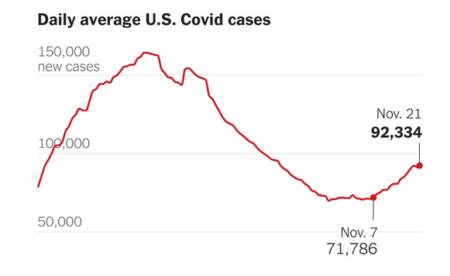Angry women, bots in the nose, it’s the pharmacies’ fault, and more
24 Nov 2021
Posted by Andrew Kantor
Federal jury: Pharmacies to blame
A federal jury in Cleveland has ruled that CVS, Walgreens, and Walmart did not do enough to stop the flow of opioids into two Ohio counties. It may seem small, but this verdict — which the companies are appealing, of course — “could set the tone for U.S. city and county governments that want to hold pharmacies accountable for their roles in the opioid crisis.”
Attorneys for the three pharmacy chains maintained they had policies to stem the flow of pills when their pharmacists had any concerns and would notify authorities about suspicious orders from doctors. They also said it was the doctors who controlled how many pills were being prescribed for legitimate medical needs.
Why yes, there will in fact be a lot more to come. The counties claim $2 billion in damages; no award has been set yet.
Before you take that aspirin…
Be aware that a study of 30,827 patients (published by the European Society of Cardiology) found that “Aspirin use is associated with a 26% raised risk of heart failure in people with at least one predisposing factor for the condition.”
So if you’re already at risk for heart failure, it’s time to look at the Tylenol … unless you also have liver issues. Motrin for the win … unless you’re pregnant. Meh, just deal with it.
Babies make women mad
Yes, really. They won’t call them pheromones, but Israeli neuroscientists found that babies (human ones) give off a scent — they call it “hexadecanal” or simply “HEX” — that makes women more aggressive and men more … docile.
After frustrating study participants in a game against what they thought was a human opponent, women who were smelling the HEX, when given the chance to blast their opponents with noise, “responded 19 percent more aggressively in the follow up noise-blast test.”
Men, meanwhile, ever the thoughtful and calm gender, were even more so when they smelled HEX, and “responded 18.5 percent less aggressively than men who didn’t [smell it].”
Next time, maybe lead with “bleeding brains”
You may have heard that a patient died after taking the controversial Alzheimer’s drug Aduhelm — “Concerns grow” were the headlines.
You may think, “That’s a tragedy, but one patient’s reaction isn’t cause for panic.”
Agreed. But how about “41 percent of patients in key clinical trials […] experienced brain bleeding or swelling“?
Covid goes everywhere
Attention, human organs! If you’re unaffected by Covid-19, please step forward. Not so fast, adrenal glands!
(The German researchers who did the study say that Covid-19 itself, while it damages the adrenal glands, didn’t necessarily stop them from functioning. However, it “could trigger a predisposition for adrenal dysfunction.”)
What you need to know about the pandemic in one chart (well, two)

But Georgia is doing OK at the moment:

FDA eases clozapine REMS
The FDA’s clozapine safety program — the Risk Evaluation and Mitigation Strategy (REMS) — is causing a heck of a lot of confusion, our friends at NCPA report, that the agency is temporarily suspending some requirements “allowing pharmacists to dispense clozapine without a REMS dispense authorization.”
Fun fact:
[C]ontinuity of care, patient access to clozapine, and patient safety are among the FDA’s highest priorities.
If you have questions or concerns about the clozapine REMS program or its website, please contact FDA at druginfo@fda.hhs.gov or (855) 543-3784.
(Correction: An earlier version of this story incorrectly reported that “fear and surprise, surprise and fear, are among FDA’s highest priorities*.” We regret the error.)
* Those are actually DEA priorities.
Just keep away from the 5G tower
Korean researchers have created microrobots that can be inserted in the nose, and are able to make their way to the brain where they deliver stem cells (using, of course, nanoparticles).
The robot is controlled from the outside via magnetic fields — no, a self-driving one isn’t in the works — “facilitating quick and accurate delivery to the target point.”
Latest ancient medical thing that shows promise today
Working with the aboriginal people of Australia, those shifty Danes have found an Australian desert plant of the Eremophila genus— aka figworts — that has an particularly interesting flavanoid. It “appears to inhibit cancer cells’ ability to defend themselves against chemotherapy.”
[T]hey tested the substance on human cancer cells in combination with SN-38, which is the active substance of the drug irinotecan that is used to fight e.g., aggressive lung cancer and colon cancer. The results showed that a combination of the natural substance and chemotherapy was able to inhibit the cancer cells’ ability to fight the medicine.
These particular plants only grow in Australia, where they’ve been used for medicine for years.
The Long Read: Supplementary Reading edition
“Everything Is a Multivitamin” from the Atlantic.
In 1994, the federal government — pressured by the supplement industry (including front-man and totally sane person Mel Gibson) — declined to regulate vitamins and supplements. That meant the market entered an Ayn Rand-esque world where anything goes, from hair-growth supplements to hangover cures, to productivity boosters, no proof or even quality checks required.
Nothing about how supplements are marketed or packaged makes them easy to understand or compare for the people buying them. The regulatory changes passed in 1994 mean manufacturers are not required to disclose much at all, including potential side effects and drug interactions.
With no research, and with many supplements “substantially different than what it claims to be,” you’re on your own.


